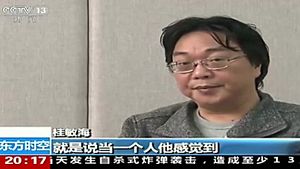The growing number of kidnapped and unlawfully detained dissidents in China were at the center of the attention of the UN Human Rights Council`s 33rd session last week in Geneva. Addressing the council, Angela Gui, a 22-year old student and daughter of bookseller and free expression advocate Gui Minhai, asked the Council to make sure that her father’s case–and the situation of the growing number of unlawfully detained dissidents in China–stays a priority in its work.
Gui Minhai, and four of his colleagues–writers and booksellers associated with Mighty Current publishing house in Hong Kong–all disappeared one after the other between October and December 2015. On 17 October 2015, Gui Minhai was abducted from his apartment in Pattaya, Thailand by unknown people. Two weeks later, four men came to search his apartment and took with them his laptop and other personal items.
“My father Gui Minhai, a Swedish citizen, was abducted from Thailand and brought into detention in China last October. He paid with his freedom for his work as a publisher, and defender of free expression. Neither our family nor the Swedish embassy have received any detention notice, nor been told where he is. I am denied regular contact with my father, and have not been given any information on his treatment, health, or legal status” said Angela Gui in her speech at the Human Rights Council.
The Mighty Current publishing house reportedly has published around 200 books on Chinese President Xi Jinping and about the private lives of Chinese senior party leaders. Titles include The Mystery of Xi’s Family Fortune, The Dark History of the Red Emperor and The Collapse of Xi Jinping. The Western media usually call these books ‘gossip’ or ‘tabloid’ books. However, the daughter of Gui Minhai, an author of some these works, does not agree with such a description. “Much of Western media has been quick to dismiss the books as ‘baseless gossip’, however I don’t think this is entirely true. Many contain political theories and are banned for that reason. A good example is one of the publishing house’s bestsellers titled The Great Collapse of 2014. “I also tend to think that gossip and tabloid journalism is more powerful and important in a democracy than many people want to give it credit for, especially in a society where so much information is censored” says Angela.
Her father never thought of being arrested in Thailand and was sure that he would be safe there. “We only touched on the subject of his safety and his work once or twice; I remember asking him about it and him saying that what he was doing was legal in Hong Kong and that as long as he stayed away from the mainland he would be safe. I don’t think he ever thought he would be arrested in Thailand,” according to Angela.
Since 2015, China has allegedly begun abducting dissidents from third countries. Angela Gui thinks that the international community ought to take his father`s case more seriously. According to Angela, it important to understand that Gui Minhai`s case is not an isolated incident but part of a larger effort to impose even harsher constraints to the already very limited freedom of expression not only within China, but also abroad. “China has never kidnapped a foreign citizen from a third country before, and I think the international community ought to take this very seriously,” Angela notes.
Actually, China has started increasingly tracking down opponents abroad as Chinese president Xi Jinping had launched Operation Fox Hunt last year to repatriate Chinese fugitives abroad and has since brought home hundreds of people wanted by Beijing, on corruption charges, but also human rights advocates and dissidents. Operation Fox Hunt has been fruitful bringing back more than 800 people from 68 countries.
According to Human Rights Watch, Dong Guangping a member of the banned Chinese Democratic Party has been arrested in Thailand. In October 2015, Bao Zhuoxuan, the son of the imprisoned Chinese human rights lawyer Wang Yu, was detained near Myanmar’s border with China after apparently trying to flee to the US. The book publisher Yiu Manting also was captured in Hong Kong and sentenced to 10 years in China for “illegal trading.”
International NGOs in Geneva, such as the International Service for Human Rights (ISHR) have been actively working to seek accountability from the Chinese Government regarding human rights defenders harassment and detainment in China.
ISHR acts as the primary voice of the issue of vanished and detained dissidents in China at the UN. Sarah Brooks, Asia Program Manager at ISHR, told The Diplomat that China’s ongoing crackdown on human rights is no longer limited to its national borders. “China is exporting its paranoia and its poor practices – disappearances, arbitrary detention and censorship of dissent. This is a worrying sign for activists and organizations throughout Asia and beyond. China’s efforts to quash dissent and discourage human rights activism have intensified under Xi Jinping. This message does not stop at China’s border. We are increasingly concerned about the ability and impunity of the Chinese government to exert its influence on other governments – in particular Thailand, but also Malaysia and Myanmar – to restrict fundamental freedoms when it suits Beijing’s interests,” underlines Brooks.
Another Chinese human rights lawyer, Gao Zhisheng, was arrested for speaking out against injustice. Despite the fact that he had been named “one of the country`s best ten lawyers” he was stripped naked and tortured with electricity during his detainment. The ISHR has published his daughter Grace Geng`s article about her father and their life without him. She wrote that if in countries like America solitary confinement cannot be longer than 30 days “because it’s known to cause mental breakdowns. In China they locked my father in solitary confinement for three years.”
Cholpon Orozobekova is a Geneva-based journalist and analyst specializing in Central Asia.

































